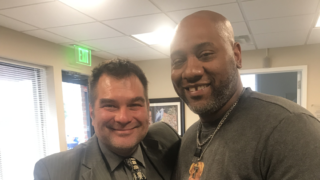
Prince George's County
9500 Medical Center Drive
Suite #250
Largo, MD 20774
Anne Arundel County
90 Ritchie Highway
Suites A & B
Pasadena, MD 21122
Charles County
2505 Davis Road
Waldorf, MD 20603
Burnett Center for Hope & Healing
P.O. Box 838
4559 Sixes Road
Prince Frederick, MD 20678

More Hospice & Palliative Care Articles
Filling the Gap With Supportive Care

Brian Thompson calls Aug. 29, 2013, his new birthday. That was the day when the Navy veteran learned he had stage 4 non-small cell lung cancer. He was 43.
He told the doctors to give him everything he could handle. “All of them were saying, ‘Hey, how you’re going to beat this is up here’,” Thompson said, pointing to his head. “They said, ‘We could give you all the medicine that technology provides, but you have to have a positive mindset.’”
Soon after his new birthday, Thompson was referred to Dr. Eric Bush who was at that time Medical Director for Frederick Memorial Pain and Palliative Care and Hospice of Frederick County. “I walked into his office, and of course I was a mess. Because I thought, ‘Am I going to live a month? Am I going to live six months?’ I really didn’t know.”
He went to Bush for pain management, and that was important. But most importantly, Bush put him and his whole family at ease. “The main thing for me is he helped me up here, in my mind,” Thompson said.
Eight years later, he is still seeing Bush, but in the Hussman Supportive Care Center in Pasadena, as Bush is now Chief Medical Officer for the nonprofit Hospice of the Chesapeake. Thompson shared his story so people can see how supportive care is helping him live not only a longer life, but a quality life.
Supportive care, also known as palliative care, fills a much-needed gap between the treatment someone receives when first diagnosed with a life-limiting disease and the moment when a family chooses hospice care. From the beginning, the team serves as advocates for patients as they determine the right care for their disease. When it’s time to discuss end-of-life care, supportive care patients are prepared, making the transition less stressful and on their own terms. Supportive care goes on for as long as a patient needs it, as Thompson’s long-term relationship with Bush demonstrates.
Both men said that living with a chronic illness is a marathon. It may start out as a sprint, but then a patient needs help pacing their journey. Continuously living with illness requires support. Thompson and Bush want people to be aware supportive care can be an important part of the healthcare puzzle.
Pictured: Dr. Eric Bush poses with his patient of 8 years, Brian Thompson, in the Hussman Supportive Care Center on the John & Cathy Belcher Campus in Pasadena.
Other Articles You May Find of Interest...
- How Hospice Social Workers Make Everyday Moments That Matter
- Volunteers Are Vital Members Of The Hospice Clinical Team
- Courageous Conversations Are a Gift to Those You Love
- Improving Access For Blacks To Hospice and Supportive Care
- What Our Chief Medical Officer Wants You To Know About Hospice
- Spiritual Care: What To Expect When The Hospice Chaplain Visits
- How Love Led The Modern Hospice Movement

















